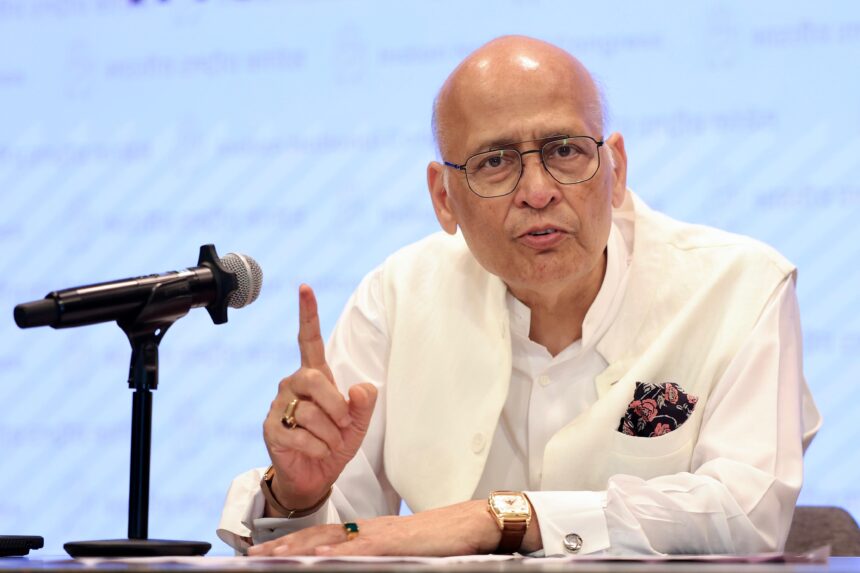NewzVille Desk
The Congress today questioned the conduct of the Election Commission of India regarding the Special Intensive Revision (SIR) exercise in Bihar and its resistance to accepting Aadhar as the proof of identity for getting registered as a voter.
Addressing a press conference at the AICC headquarters in New Delhi, party spokesperson, MP and member of Congress Working Committee Dr Abhishek Manu Singhvi pointed out how the ECI continuously resisted Aadhar as proof of identity that the Supreme Court had to finally issue a categorical directive about it.
Dr Singhvi also questioned the ECI’s intentions in targeting senior Congress leader Pawan Khera, suggesting that it was done merely because he keeps on asking questions to the Commission.
He strongly objected to making personal details of the senior party leader public by the Commission.
He said, the SIR exercise is not just deeply concerning but also possesses the effect of leading to extreme and unfavourable consequences for the people of Bihar.
“Despite repeated concerns raised by political parties, civil society, and citizens, the ECI has chosen opacity over transparency, silence over accountability, and reluctance over responsibility”, he remarked.
Dr Singhvi noted, firstly, the ECI failed to conduct any consultative exercise prior to initiating the SIR exercise in Bihar.
Secondly, he added, the ECI failed to provide any convincing justification to initiate an intensive exercise such as the present in such a short span of time.
Thirdly, he said, the ECI undertook the SIR exercise in a state, which is bound for polls in the same year, which is in complete violation of its own precedents.
“In the year 2003, the states of Maharashtra and Arunachal Pradesh were deliberately exempted from the SIR exercise on grounds that elections were scheduled to be held in less than 6 months”, he pointed out.
Referring to the exclusion of Aadhar as proof of identity, he said, the Indian National Congress along with other political parties had to repeatedly approach the Supreme Court due to several public interest issues arising out of the Bihar SIR exercise.
Dr Singhvi pointed out that the Supreme Court on three different dates directed the Election Commission to accept Aadhar as valid documentation citing the potential for mass exclusions. “Begrudgingly the ECI gave in, but despite these directions, the approach of the electoral officers remained indifferent and blissfully ignorant, in continuing to deny voters inclusion in the electoral roll on the basis of the Aadhar document”, he added.
He said, finally, on September 8, 2025, the Supreme Court categorically clarified that Aadhar shall be accepted by the ECI as a 12th document for the purpose of inclusion in the revised voter list.
Referring to another issue of a show-cause notice issued by the District Election Office, New Delhi District to Pawan Khera on September 2 through its official X handle, Dr Singhvi said, the notice placed his personal details in the public domain even before giving him an opportunity of being heard.
“The public dissemination of the show-cause notice makes it clear that the ECI has already pre-adjudicated the issue against Mr. Pawan Khera. This has no sanction in the Representation of the People’s Act or the Rules”, he said.
Dr Singhvi specifically objected to the manner and mode in which the notice was publicised on official social-media handles, inviting adverse media commentary prior to any inquiry and publicly disclosing Mr. Pawan Khera and Ms. Kota Neelima’s residential details without their consent or prior notice.
Putting the record straight, he said, Pawan Khera was registered in constituency number 40, which is New Delhi. After relocation to Jangpura in 2017, he submitted Form 6 in compliance with Rule 13 of the Registration of Electors Rules, 1960. In this form, he disclosed that the details of his prior registration, including the constituency, address and earlier EPIC number. In the due course of law, his name was included in the electoral roll of Jangpura constituency, and a new EPIC number was issued to him. A copy of receipt of the Form 6 submitted by him was also provided by the EC on August 18, 2017.
“In fact, the nature of the notice being a public chargesheet could have well been avoided by the minutest degree of due diligence by the Commission”, he observed, asking, “why did the ECI not conduct a brief enquiry into its own records before issuing the notice in the public domain?”





